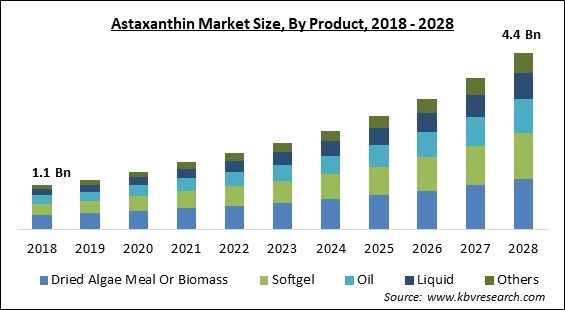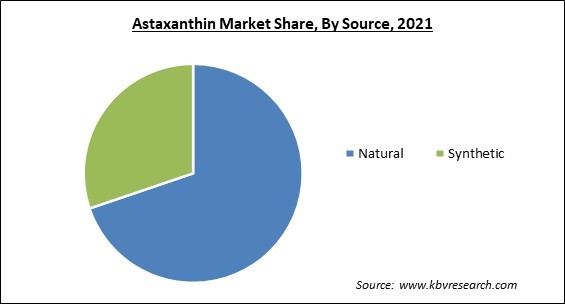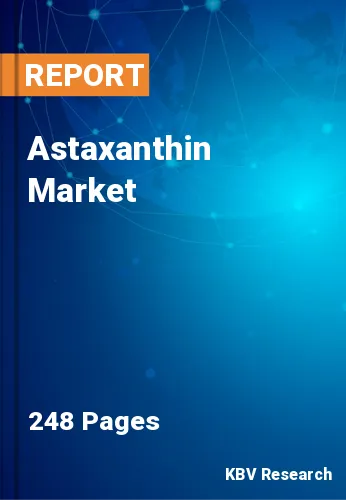The Global Astaxanthin Market size is expected to reach $4.4 billion by 2028, rising at a market growth of 15.0% CAGR during the forecast period.
Astaxanthin refers to a red-pink pigment mostly available in different seafood and in the feathers of quails and flamingos. The structure of astaxanthin is same as the beta-carotene, also called pro-vitamin A, but it has various chemical differences. Therefore, it is safe to consume astaxanthin. The curiosity about astaxanthin is sustained by a large number of proofs that propose that astaxanthin has a strong antioxidant capacity which leads to various good health outcomes after consumption.

The rising demand for astaxanthin from different end users like cosmetics, pharmaceuticals, nutraceuticals, food & beverages, aquaculture & animal feed, and others is the major growth factor for the market growth. Furthermore, the market is predicted to grow in the future years due to the existence of some organizations promoting awareness regarding the usage of such products.
The rising awareness of nutritional products and growing acceptance of dietary supplements to avoid the high cost of hospitalization and lesser side effect of astaxanthin are the major factors that are expected to increase the demand for nutraceuticals and natural antioxidants. Astaxanthin is a strong antioxidant with various health advantages.
Astaxanthin is more effective than antioxidants like vitamin E. Furthermore, it provides an essential dietary supplement and is popularly consumed to overcome several health consequences. Some consequences are cardiovascular diseases, diabetes, and cancer. Because of rising awareness about nutrition-rich supplements among people, there will be a rise in the growth of the nutraceutical businesses at a fast speed.
The widespread of COVID-19 has remarkably impacted the astaxanthin market. The pandemic period has highlighted the importance of healthy, safe, and nutritive eating habits among people all over the world. During the pandemic period, the manufacturers of astaxanthin faced substantial problems to fulfill the rising demand for the functional food as per the consumer’s changing tastes and preferences. The prices of raw materials were also raised because of trade barriers, disturbance in the supply of raw materials, and poor distribution channels due to the restrictions imposed to combat the spread of COVID-19. The less availability and rising prices of raw materials, and rising cost of production became hurdles to the growth of the astaxanthin market during pandemic period.
As the spending ability of the consumer rises, a significant rise has been seen in the world’s cosmetic business. This development is majorly seen in the emerging economies. The demand for skin whitening products and the increasing usage of cosmetics in semi-urban and rural areas are important growth factors for the cosmetic business in these countries. Nutricosmetic and cosmeceuticals are attaining high acceptance, especially in developed countries, like United States, Canada, and others. Astaxanthin has several advantages as a precautionary application, mainly as a sun care. Further, because of this, the rising demand for cosmetic products would offer growth opportunities to the astaxanthin market.
Astaxanthin acts as an anti-cancer and anti-oxidant agent which prevents from cardiovascular disease, diabetes, and neurodegenerative diseases and improves the immune system. Additionally, it acts as an anti-aging agent and is proven beneficial in preventing from age-related muscle deterioration. It can also help in removing and resisting fatigue. Pharmaceuticals application use astaxanthin in form of dosages like capsules, soft gels, oils, creams, biomass, and granulated powder. Because of their advantageous properties, astaxanthins are also used as an antioxidant to enhance nutritional value. Due to these health benefits of astaxanthin, the consumption of ASX as health supplement has increased, thereby leading to market growth.
The issue regarding adulteration in astaxanthin has become an utmost challenge for the astaxanthin market. Adulterated astaxanthin is highly dangerous for humans, animals, and the environment. Animals cannot independently produce astaxanthin and have to rely on food. Not providing appropriate nutrients to the feed and food products can be harmful for both animals and humans. The rate of adulteration of astaxanthin, particularly in developed region’s is growing. Synthetic astaxanthin being marketed these days is produced from petrochemicals or genetically mutated yeast which is harmful for human consumption. Thus, the adulteration poses a significant challenge to market growth during projection period.
On the basis of source, the astaxanthin market is classified into natural and synthetic. In 2021, the synthetic astaxanthin segment garnered a substantial revenue share in astaxanthin market. It is a carotenoid of high value which is manufactured by chemical synthesis and also by removal of the biomass of the microalga Haematococcus Pluvialis. Apart from this, other microalgae also have the ability to be utilized as a source for the production of astaxanthin. The molecules of synthetic astaxanthin are derived from petroleum sources, and it is widely used in aquaculture.

On the basis of product, the astaxanthin market is segmented into dried algae meal or biomass, oil, soft gel, and liquid. In 2021, the dried algae meal or biomass segment witnessed the largest revenue share in the astaxanthin market. By keeping the body healthy and free from infections and diseases and further boosting immunity and stamina, astaxanthin offers a wide range of advantages to the human body and aids in leading a healthy lifestyle. With the rising awareness regarding health and health lifestyle among people, the market is predicted to surge in this segment.
On the basis of application, the astaxanthin market is bifurcated into nutraceuticals, cosmetics, aquaculture & animal feed, food and others. In 2021, the aquaculture & animal feed segment held the largest revenue share in astaxanthin market. It has been considered that the usage of astaxanthin in aquaculture can improve the immunity of animals, decrease mortality and avoid antibiotics abuse. Additionally, astaxanthin has a major act in the pigmentation of some aquatic animals like, rainbow trout and ornamental fish.
| Report Attribute | Details |
|---|---|
| Market size value in 2021 | USD 1.7 Billion |
| Market size forecast in 2028 | USD 4.4 Billion |
| Base Year | 2021 |
| Historical Period | 2018 to 2020 |
| Forecast Period | 2022 to 2028 |
| Revenue Growth Rate | CAGR of 15% from 2022 to 2028 |
| Number of Pages | 248 |
| Number of Tables | 480 |
| Report coverage | Market Trends, Revenue Estimation and Forecast, Segmentation Analysis, Regional and Country Breakdown, Companies Strategic Developments, Company Profiling |
| Segments covered | Product, Source, Application, Region |
| Country scope | US, Canada, Mexico, Germany, UK, France, Russia, Spain, Italy, China, Japan, India, South Korea, Singapore, Malaysia, Brazil, Argentina, UAE, Saudi Arabia, South Africa, Nigeria |
| Growth Drivers |
|
| Restraints |
|
Region wise, the astaxanthin market is analyzed across North America, Europe, Asia Pacific and LAMEA. In 2021, the North America region projected the highest revenue share in the astaxanthin market. The usage of astaxanthin in medical processes is also getting approval in this region because of the rising awareness regarding the health benefits provided by the astaxanthin. The increasing practice of aquaculture in the North American region has developed the popularity of astaxanthin. U.S. and Mexico have huge population that consumes seafood which need astaxanthin as an ingredient in processing the functionality of the food and also in various health supplement for customers. As a result, the market in this region is projected to grow.
Free Valuable Insights: Global Astaxanthin Market size to reach USD 4.4 Billion by 2028
The market research report covers the analysis of key stake holders of the market. Key companies profiled in the report include E.I.D. Parry Limited (Murugappa Group), Cyanotech Corporation, ENEOS Corporation (Eneos Holdings), Algatech Ltd. (Solabia Group), MicroA AS, Beijing Gingko Group, Algalif Iceland ehf, Piveg, Inc., Fuji Chemical Industries Co., Ltd., and Atacama Bio Natural Products S.A.
By Product
By Source
By Application
By Geography
The global Astaxanthin Market size is expected to reach $4.4 billion by 2028.
Rising demand for cosmetic products are driving the market in coming years, however, Adulteration risk associated with astaxanthin restraints the growth of the market.
E.I.D. Parry Limited (Murugappa Group), Cyanotech Corporation, ENEOS Corporation (Eneos Holdings), Algatech Ltd. (Solabia Group), MicroA AS, Beijing Gingko Group, Algalif Iceland ehf, Piveg, Inc., Fuji Chemical Industries Co., Ltd., and Atacama Bio Natural Products S.A.
The Natural segment acquired maximum revenue share in the Global Astaxanthin Market by Source in 2021 thereby, achieving a market value of $3 billion by 2028.
The North America market dominated the Global Astaxanthin Market by Region in 2021, and would continue to be a dominant market till 2028; thereby, achieving a market value of $1.7 billion by 2028.
Our team of dedicated experts can provide you with attractive expansion opportunities for your business.

